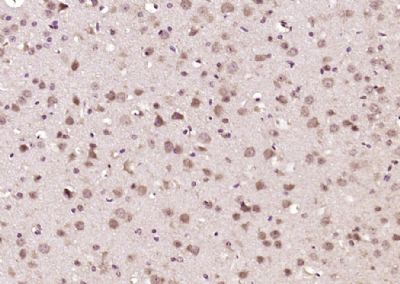FAM175B Polyclonal Antibody
Purified Rabbit Polyclonal Antibody (Pab)
- SPECIFICATION
- CITATIONS
- PROTOCOLS
- BACKGROUND

Application
| IHC-P, IHC-F, IF, ICC, E |
|---|---|
| Primary Accession | Q15018 |
| Reactivity | Rat, Pig, Bovine |
| Host | Rabbit |
| Clonality | Polyclonal |
| Calculated MW | 67 KDa |
| Physical State | Liquid |
| Immunogen | KLH conjugated synthetic peptide derived from human FAM175B |
| Epitope Specificity | 41-140/415 |
| Isotype | IgG |
| Purity | affinity purified by Protein A |
| Buffer | 0.01M TBS (pH7.4) with 1% BSA, 0.02% Proclin300 and 50% Glycerol. |
| SIMILARITY | Belongs to the FAM175 family. Abro1 subfamily. |
| SUBUNIT | Component of the BRISC complex, at least composed of the FAM175B/ABRO1, BRCC3/BRCC36, BRE/BRCC45 and BABAM1/NBA1. Does not interact with BRCA1. Binds polyubiquitin. |
| Important Note | This product as supplied is intended for research use only, not for use in human, therapeutic or diagnostic applications. |
| Background Descriptions | FAM175B (ABRO1) is a 415 amino acid protein, sharing 39% identity to ABRA1 in the N terminal two thirds of the protein (amino acids 1 to 260), including a coiled-coil domain and a region called the ABR domain. However, ABRO1 lacks the phosphorylated ser-X-X-phe motif of ABRA1 and, unlike ABRA1, does not bind to BRCA1. |
| Gene ID | 23172 |
|---|---|
| Other Names | BRISC complex subunit Abraxas 2 {ECO:0000312|HGNC:HGNC:28975}, Abraxas brother protein 1, Protein FAM175B, ABRAXAS2 (HGNC:28975) |
| Dilution | IHC-P=1:100-500,IHC-F=1:100-500,ICC=1:100-500,IF=1:100-500,ELISA=1:5000-10000 |
| Storage | Store at -20 ℃ for one year. Avoid repeated freeze/thaw cycles. When reconstituted in sterile pH 7.4 0.01M PBS or diluent of antibody the antibody is stable for at least two weeks at 2-4 ℃. |
| Name | ABRAXAS2 (HGNC:28975) |
|---|---|
| Function | Component of the BRISC complex, a multiprotein complex that specifically cleaves 'Lys-63'-linked polyubiquitin, leaving the last ubiquitin chain attached to its substrates (PubMed:19214193, PubMed:20032457, PubMed:20656690, PubMed:24075985). May act as a central scaffold protein that assembles the various components of the BRISC complex and retains them in the cytoplasm (PubMed:20656690). Plays a role in regulating the onset of apoptosis via its role in modulating 'Lys-63'-linked ubiquitination of target proteins (By similarity). Required for normal mitotic spindle assembly and microtubule attachment to kinetochores via its role in deubiquitinating NUMA1 (PubMed:26195665). Plays a role in interferon signaling via its role in the deubiquitination of the interferon receptor IFNAR1; deubiquitination increases IFNAR1 activities by enhancing its stability and cell surface expression (PubMed:24075985, PubMed:26344097). Down- regulates the response to bacterial lipopolysaccharide (LPS) via its role in IFNAR1 deubiquitination (PubMed:24075985). Required for normal induction of p53/TP53 in response to DNA damage (PubMed:25283148). Independent of the BRISC complex, promotes interaction between USP7 and p53/TP53, and thereby promotes deubiquitination of p53/TP53, preventing its degradation and resulting in increased p53/TP53-mediated transcription regulation and p53/TP53-dependent apoptosis in response to DNA damage (PubMed:25283148). |
| Cellular Location | Cytoplasm. Nucleus. Cytoplasm, cytoskeleton, spindle pole. Cytoplasm, cytoskeleton. Note=A minor proportion is detected in the nucleus (PubMed:21282113, PubMed:22974638). Translocates into the nucleus in response to DNA damage (PubMed:25283148). Directly binds to microtubules and is detected at the minus end of K-fibers (PubMed:26195665). Co-localizes with NUMA1 at mitotic spindle poles (PubMed:26195665). |
| Tissue Location | Detected in heart muscle (at protein level). Detected in heart and muscle, and at much lower levels in brain (PubMed:21195082). |

Thousands of laboratories across the world have published research that depended on the performance of antibodies from Abcepta to advance their research. Check out links to articles that cite our products in major peer-reviewed journals, organized by research category.
info@abcepta.com, and receive a free "I Love Antibodies" mug.
Provided below are standard protocols that you may find useful for product applications.
If you have used an Abcepta product and would like to share how it has performed, please click on the "Submit Review" button and provide the requested information. Our staff will examine and post your review and contact you if needed.
If you have any additional inquiries please email technical services at tech@abcepta.com.













 Foundational characteristics of cancer include proliferation, angiogenesis, migration, evasion of apoptosis, and cellular immortality. Find key markers for these cellular processes and antibodies to detect them.
Foundational characteristics of cancer include proliferation, angiogenesis, migration, evasion of apoptosis, and cellular immortality. Find key markers for these cellular processes and antibodies to detect them. The SUMOplot™ Analysis Program predicts and scores sumoylation sites in your protein. SUMOylation is a post-translational modification involved in various cellular processes, such as nuclear-cytosolic transport, transcriptional regulation, apoptosis, protein stability, response to stress, and progression through the cell cycle.
The SUMOplot™ Analysis Program predicts and scores sumoylation sites in your protein. SUMOylation is a post-translational modification involved in various cellular processes, such as nuclear-cytosolic transport, transcriptional regulation, apoptosis, protein stability, response to stress, and progression through the cell cycle. The Autophagy Receptor Motif Plotter predicts and scores autophagy receptor binding sites in your protein. Identifying proteins connected to this pathway is critical to understanding the role of autophagy in physiological as well as pathological processes such as development, differentiation, neurodegenerative diseases, stress, infection, and cancer.
The Autophagy Receptor Motif Plotter predicts and scores autophagy receptor binding sites in your protein. Identifying proteins connected to this pathway is critical to understanding the role of autophagy in physiological as well as pathological processes such as development, differentiation, neurodegenerative diseases, stress, infection, and cancer.


